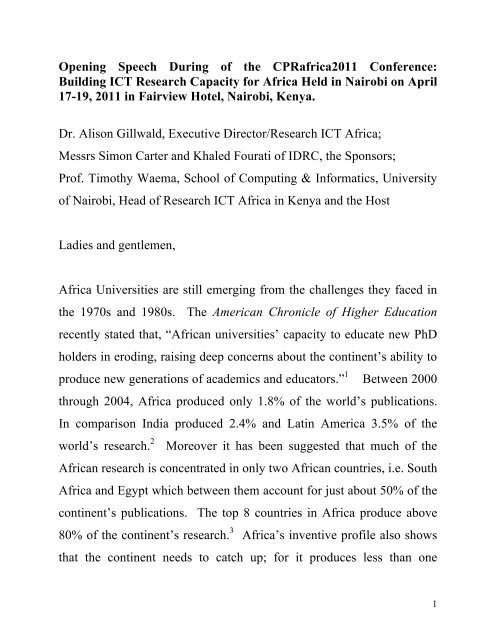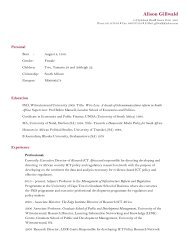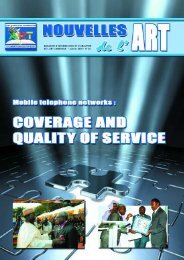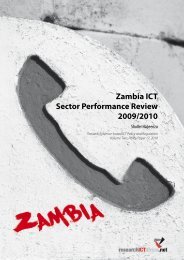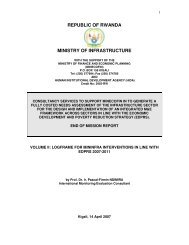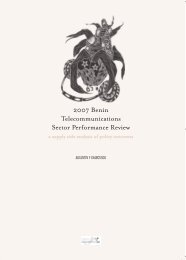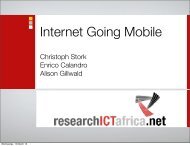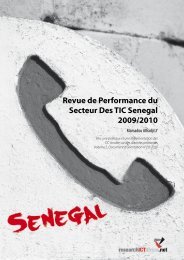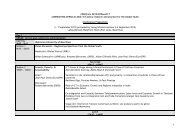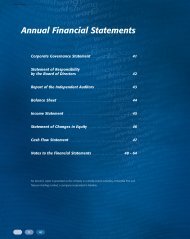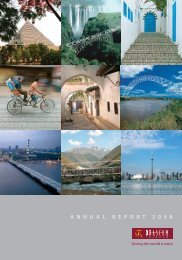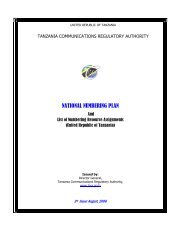Opening Speech - Research ICT Africa
Opening Speech - Research ICT Africa
Opening Speech - Research ICT Africa
You also want an ePaper? Increase the reach of your titles
YUMPU automatically turns print PDFs into web optimized ePapers that Google loves.
<strong>Opening</strong> <strong>Speech</strong> During of the CPRafrica2011 Conference:<br />
Building <strong>ICT</strong> <strong>Research</strong> Capacity for <strong>Africa</strong> Held in Nairobi on April<br />
17-19, 2011 in Fairview Hotel, Nairobi, Kenya.<br />
Dr. Alison Gillwald, Executive Director/<strong>Research</strong> <strong>ICT</strong> <strong>Africa</strong>;<br />
Messrs Simon Carter and Khaled Fourati of IDRC, the Sponsors;<br />
Prof. Timothy Waema, School of Computing & Informatics, University<br />
of Nairobi, Head of <strong>Research</strong> <strong>ICT</strong> <strong>Africa</strong> in Kenya and the Host<br />
Ladies and gentlemen,<br />
<strong>Africa</strong> Universities are still emerging from the challenges they faced in<br />
the 1970s and 1980s. The American Chronicle of Higher Education<br />
recently stated that, “<strong>Africa</strong>n universities’ capacity to educate new PhD<br />
holders in eroding, raising deep concerns about the continent’s ability to<br />
produce new generations of academics and educators.” 1 Between 2000<br />
through 2004, <strong>Africa</strong> produced only 1.8% of the world’s publications.<br />
In comparison India produced 2.4% and Latin America 3.5% of the<br />
world’s research. 2 Moreover it has been suggested that much of the<br />
<strong>Africa</strong>n research is concentrated in only two <strong>Africa</strong>n countries, i.e. South<br />
<strong>Africa</strong> and Egypt which between them account for just about 50% of the<br />
continent’s publications. The top 8 countries in <strong>Africa</strong> produce above<br />
80% of the continent’s research. 3 <strong>Africa</strong>’s inventive profile also shows<br />
that the continent needs to catch up; for it produces less than one<br />
1
thousand of the world’s inventions, of which 88% is located in South<br />
<strong>Africa</strong>. 4<br />
____________________________<br />
1. The Chronical of Higher Education: 25.11.08<br />
2. Pouris & Pouris, The State of Science and Technology in <strong>Africa</strong> (2000-2004), Scientometrics 79, 2009<br />
3. Ibid.<br />
4. Ibid<br />
Ladies and gentlemen,<br />
I do not need to underscore that fact that research and development is<br />
critical for accelerating economic development in all the newly<br />
industrializing countries.<br />
It is even more critical in the <strong>Africa</strong>n<br />
environment where currently the culture of research is minimal.<br />
Reasearch has been singled out as the missing link in <strong>Africa</strong>’s<br />
development. <strong>Africa</strong>n Governments need to allocate more resources for<br />
scientific research, development of technical capabilities of the<br />
workforce and for raising the quality of teaching mathematics, science<br />
and technology in schools, polytechniques and universities. The most<br />
serious difficulties the Science and technology community is<br />
encountering in <strong>Africa</strong> include a steady decline in R &D investment,<br />
brain drain, obsolescence (our training curricula and science facilities<br />
lag far behind those in other parts of the world) and dilapidated<br />
infrastructure.<br />
Currently there are still many <strong>Africa</strong>n countries that<br />
cannot sustain at least one good research university. Having at least one<br />
institution that carries out both basic and applied research in relevant<br />
areas of development, needs and problems would create a much needed<br />
engine for developing the knowledge base essential for a country’s<br />
2
economic growth and social development. <strong>Research</strong> universities are<br />
core components of any country’s economic, political and social<br />
development systems. If knowledge for augmenting productive power is<br />
necessary, research is the fundamental process and its institutionalization<br />
will produce researchers and further research.<br />
Ladies and gentlemen, let me now turn to the theme of this conference –<br />
<strong>ICT</strong> research capacity in <strong>Africa</strong>. I am sure the participants in this<br />
conference know better than I do that <strong>Africa</strong>’s research capacity in <strong>ICT</strong>s<br />
is very limited is very limited. Some of the reasons for this challenge<br />
include:<br />
• limited number of PhD holders who can competently supervise<br />
research and mentor young researchers. This is worsened by the<br />
brain drain to the Northern hemisphere;<br />
• very few universities with postgraduate programmes in <strong>ICT</strong>s,<br />
especially PhD programmes in computer science, information<br />
technology and related areas;<br />
• limited funding in form of scholarships and grants for <strong>ICT</strong><br />
research;<br />
• our governments paying little attention to research in general and<br />
<strong>ICT</strong> research in particular.<br />
3
• migration of good quality staff and researchers to the private sector<br />
and administrative jobs in government, thereby draining human<br />
capital away from education and research;<br />
• research agenda being dictated by the “North”, who provide the<br />
bulk of the funding; and<br />
• limited capacity to translate the little research that takes place into<br />
development outcomes for our people.<br />
Ladies and gentlemen, I want to challenge you to start taking measures<br />
to address the above challenges. In my view the first step would be to<br />
address the limited capacity for effective use and maintenance of <strong>ICT</strong><br />
infrastructure at the various levels including our educational institutions.<br />
This would enhance e-learning at all levels to increase access and quality<br />
of education. I believe that research in general and <strong>ICT</strong> research in<br />
particular is so critical for the development of our <strong>Africa</strong>n countries that<br />
urgent action is required. Although the <strong>Africa</strong>n countries committed to<br />
spending 1% of GDP on Science and Technology (AU Abuja<br />
Declaration), very few countries have actually implemented this<br />
commitment. Available figures suggest the overall government support<br />
for R&D in <strong>Africa</strong> is one of the lowest in the world (about 0.2% of<br />
GDP) many experts agree the investment needs to be above 1% of GDP<br />
to have any significant impact. S&T investments in most developed<br />
countries is closer to 3% of GDP. We require a visionary and<br />
4
committed leadership that understands the role of research and <strong>ICT</strong>s in<br />
development.<br />
I note that this conference was preceded by a workshop to train and<br />
mentor young researchers in <strong>ICT</strong>s. This is really commendable and I<br />
want to encourage <strong>Research</strong> <strong>ICT</strong> <strong>Africa</strong> (RIA) to continue with this<br />
annual young scholars training workshop and the annual CPRafrica<br />
conference. They will go along way in creating a strong research<br />
community and addressing some of the challenges facing <strong>Africa</strong>’s <strong>ICT</strong><br />
research as outlined earlier. It is my hope that this series of annual<br />
conferences will help to create a strong continental network of<br />
researchers that will begin to have a life of its own.<br />
Finally, I wish you an engaging and successful conference.<br />
I thank you and God bless you all.<br />
Prof. Lucy Irungu<br />
Deputy Vice-Chancellor in charge of <strong>Research</strong>, Production and<br />
Extension (RPE)<br />
University of Nairobi<br />
5


